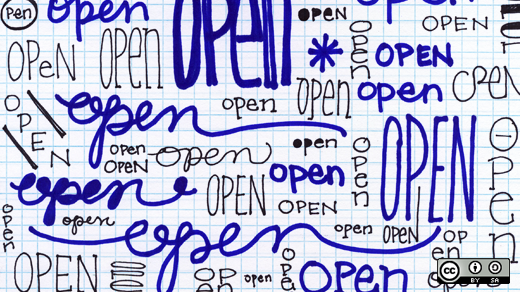Amongst several concepts of openness that Open Knowledge MOOC has turned its attention to recently is that of open scholarship, asking us to consider how the new principles of openness, as facilitated by digital means, affect the way in which knowledge is produced, published, disseminated and reviewed and entreating us to think about the limits, or tensions, that ever greater openness may bring. This segues nicely with the material that I’ve just covered in the Open Research course from OER Research Hub and the new MOOC on the block, Networked Scholars #scholar14.
One of #okmooc’s core readings was ‘Assumptions and Challenges of Open Scholarship‘, co-authored by George Veletsianos and Royce Kimmons (coincidentally, George Veletsianos is the ‘main man’ over at Networked Scholars). Anyway, I enjoyed reading this article, the dual aim of which was to identify the assumptions of open scholarship and to highlight the challenges associated with open scholarship’s aspirations for broadening access to education and knowledge.

Most notably, I enjoyed reading the paper because it called out the edtech community for being overly optimistic when stating technology’s roll in educational transformation and displaying a lack of critique of open educational practices.
such critiques are largely absent from the educational technology field, as members of the field tend to focus on the promises of educational technologies, rarely pausing to critique its assumptions (Selwyn, 2011, pp. 713).
Veletsianos and Kimmons’ paper went on to declare a pressing need for the understanding of educational technology narratives and their unfulfilled potential. Citing Hall (2011, pp. 11) they said,
in order to understand our present position, and to develop alternatives that matter, we need stories and metaphors and critiques of where we are.
Such a challenge made me think of Audrey Watters‘ recent and awesome keynote speech at altc, entitled Ed-Tech’s Monsters. Indeed, it really is “a [fascinating] romp through literature and the cultural history of ed-tech” that, by retracing connections through narratives and counter-narratives, talks about teaching machines and monsters and also serves to inspire a re-examination of the Luddite cause as a critical starting point.
The inherent assumptions Veletsianos and Kimmons identify within Open Scholarship are:
- Ideals of Democratization, Human Rights, Equality, and Justice
- Emphasis on Digital Participation for Enhanced Outcomes
- Co-Evolutionary Relationship between Technology and Culture
- Practicality and Effectiveness for Achieving Scholarly Aims
Here, two things caught my attention. First, relating to the assumption concerning the co-evolutionary relationship between technology and culture, mention was made of the phenomenon of ‘homophily’. I must confess, I’d never heard of this term before but basically it’s the tendency to connect with similar or like-minded individuals. Therefore, in actuality, social media mightn’t after all foster the diverse spaces for knowledge exchange and negotiation that we think they do, instead leading to the creation of ‘echo chambers’: a situation in which we share knowledge and perspectives with individuals who already share the same views as ourselves. This is vitally important to recognize when developing a personal learning network (PLN). As Howard Rheingold is credited with saying,
“if your network isn’t offending you, you’re stuck in an echo chamber.”
Well, may be not offending you exactly, but definitely singing from different hymn sheets, which brings me to the second thing that caught my eye, that is the assumption that Open Scholarship is ‘capable of achieving socially valuable scholarly aims’. Here, the work of Robin Goodfellow comes to mind, a scholar whose work is in the field of new technology in teaching and learning, yet who chooses not to engage in social networking practices such as those exemplified on Twitter.
Referring to the complexity and interplay between openness, scholarship and digital technology as ‘an impossible triangle‘, he’s sceptical of Open Scholarship’s ability to deliver the aforementioned ‘socially valuable scholarly aims’. He points out that
particularly confounding is the tension between digital scholarship and open knowledge, where the former is focused on the creation by specialist communities of knowledge of a stable and enduring kind, whilst the latter is characterized by encyclopaedic knowledge and participation that is unbounded by affiliation or location.
Further, he says
that the enduring importance given to objectivity and the ‘scholarly record’ is often in tension with ideas about democratizing scholarly knowledge.
On which note I’ll sign off. It’s been worthwhile taking the time to think about open knowledge practices and the assumptions and tensions relative to Open Scholarship. It’s certainly taken me some time to think about this and get round to posting this blog. The reading was flagged up in week 6 of Open Knowledge MOOC and it’s now week 9 or something. Doh!!
References:
- Goodfellow, R. 2014. Scholarly, digital, open: an impossible triangle?. Research in Learning Technology, 21. Available from: http://www.researchinlearningtechnology.net/index.php/rlt/article/view/21366/html
- Hall, R. (2011). Triple crunch and the politics of educational technology. DMU Learning Exchanges blog. Retrieved from http://www.learnex.dmu.ac.uk/2011/06/08/triple-crunch-and-the-politics-of-educational-technology/
- Selwyn, N. 2011. Editorial: In praise of pessimism—the need for negativity in educational technology. British Journal of Educational Technology, 42(5), 713-718.
- Veletsianos, G., & Kimmons, R. (2012). Assumptions and challenges of open scholarship. The International Review of Research in Open and Distance Learning, 13(4), 166–189. Retrieved from http://www.irrodl.org/index.php/irrodl/article/view/1313

This work is licensed under a Creative Commons Attribution-ShareAlike 4.0 International License.


